Landscape Lighting Effects: 8 Dramatic Outdoor Lighting Ideas You Must Try In Your Garden
Outdoor lighting can transform your yard into magical paradise at night. Whether you are lighting your patio, walkway or garden, learn the best landscape lighting effects that will create the results you are looking for.
This is the second of three posts on landscape lighting and this week's topic is all about different types of landscape lighting effects and how to use them.
It seems like a lot of people love the look of landscape lighting but just aren't sure how to go about getting that look for their own garden.
To help with that, this week's post will go through a lot of the common outdoor lighting techniques, so you can get some ideas for your own yard. Then the next post in the series will go through the process of creating your lighting plan so that you can actually make it a reality!
And if you missed it, you might also want to check out the first post in the series, which covered different types of lighting you can use in your garden.
Keep reading to see our landscape lighting effects…and how to use them…
Down Lighting
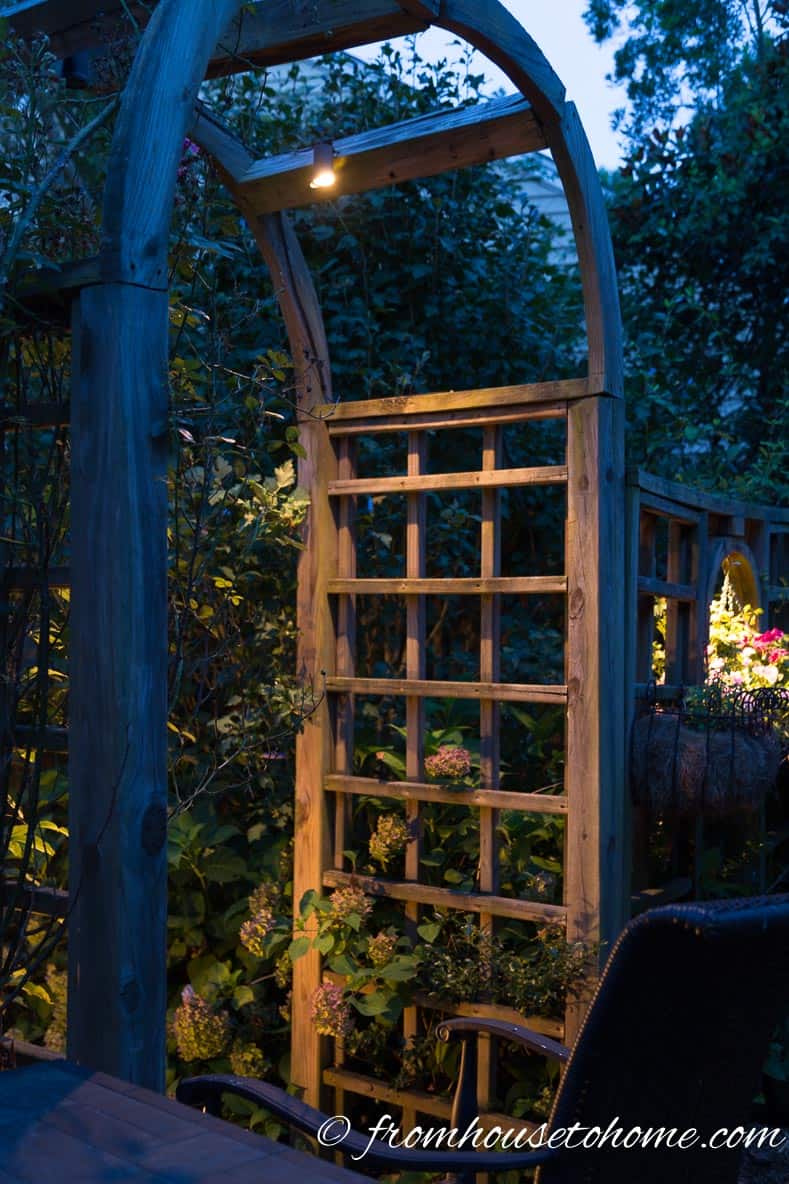
Down lighting is the first of our landscape lighting effects. It is created by hanging a spot light above the ground and pointing it downwards to highlight a plant, object or area.
It is very easy to make down lighting work because this is the way outdoor lighting happens naturally (light from the moon or street lights comes from above).
LED Low Voltage Landscape Up Light*
To make this happen in my garden, I usually buy very inexpensive spot lights that are often intended to be used for uplights.
Unless you want to hang the lights really high up, they don't need to be powerful.
Either low-voltage lights or solar lights should work for most applications.
Light The Path Under An Arbor
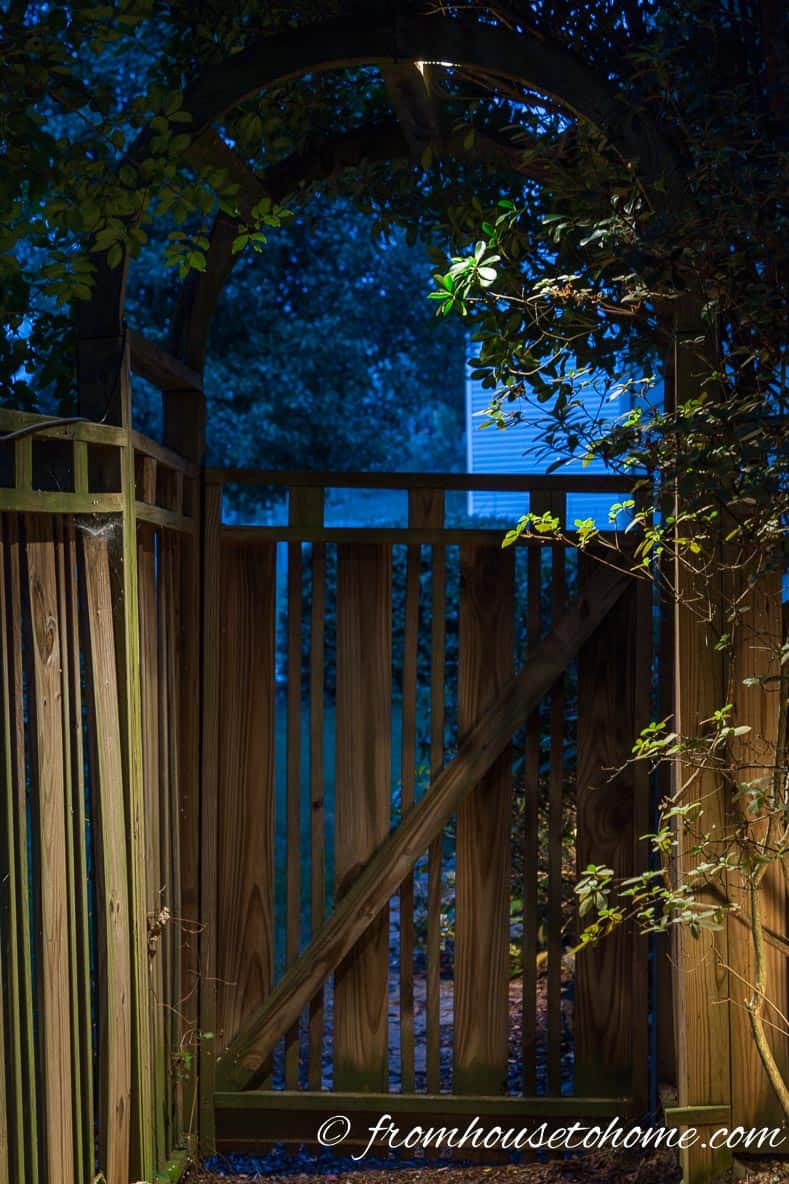
One of my favorite outdoor lighting ideas uses down lighting to create a landscape light effect called “moonlighting”. It is achieved by hanging a spot light or two at the top of an arbor (or high tree branch) pointing down. The light creates path lighting that seems very natural, almost like moonlight…which adds a very romantic feeling to your garden.
Highlight Hanging Baskets

Another outdoor lighting idea that I use quite a bit in my garden is to light hanging baskets from above. The down lighting really makes them stand out after dark.
Use inexpensive spot lights (either solar or low-voltage ones will work) to point the light down on the top of the baskets.
For this effect, you don't need a very bright light. Even the equivalent of a 7 Watt halogen bulb will provide enough light.
Illuminate A Wall Fountain
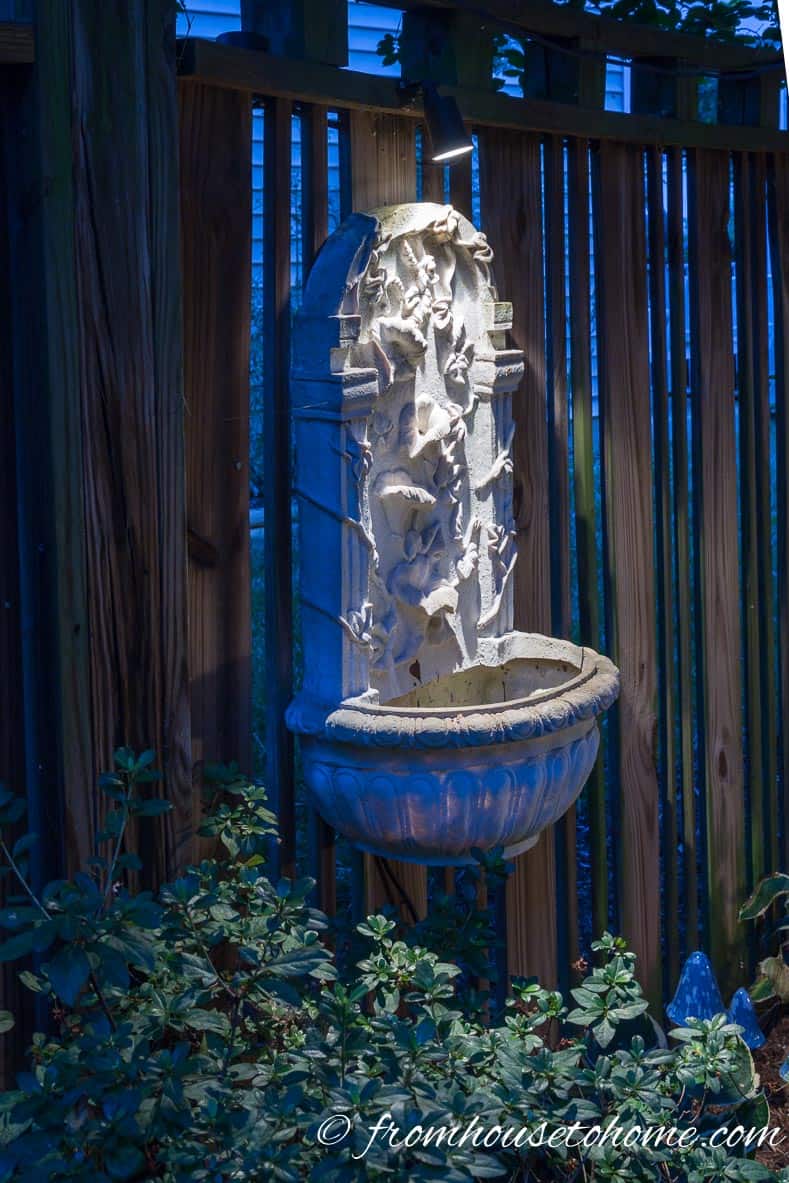
Down lighting also works really well for highlighting garden accessories, like wall fountains or artwork hanging on a fence or wall. Simply installing a light that points down on to it will showcase it.
Again, I usually use inexpensive, very low Wattage bulbs for this. They provide enough light to highlight the scene, without overwhelming it.
Uplighting
Uplighting using an uplight with a spike*
Uplighting is a very dramatic lighting effect that isn't normally found in nature. This makes it really effective in drawing attention to an area of your yard you want to highlight. However, it can also look a bit scary if it isn't done right (which is why you will see a lot of it in Halloween lighting designs).
You can achieve this one of the landscape lighting effects by installing a spot light at the bottom of plants or objects to be highlighted with the light facing upwards at an angle.
Low Voltage LED Landscape Uplight*
Uplights normally come with a stake that can be driven into the ground.
It is also useful if the light portion is easy to move, since you will likely want to change the angle to the position for your view.
In order to provide enough light, uplights need a brighter light than down lighting requires (I usually go with the equivalent of a 20 Watt bulb).
One of the tricks to making uplighting work is to make sure you are lighting a group of plants or objects within close proximity to each other. They don't all have to be up-lit, but they should be close enough together to be part of the same vignette. This will prevent the “scary movie” feeling that happens if there is a lot of black space around individual uplights.
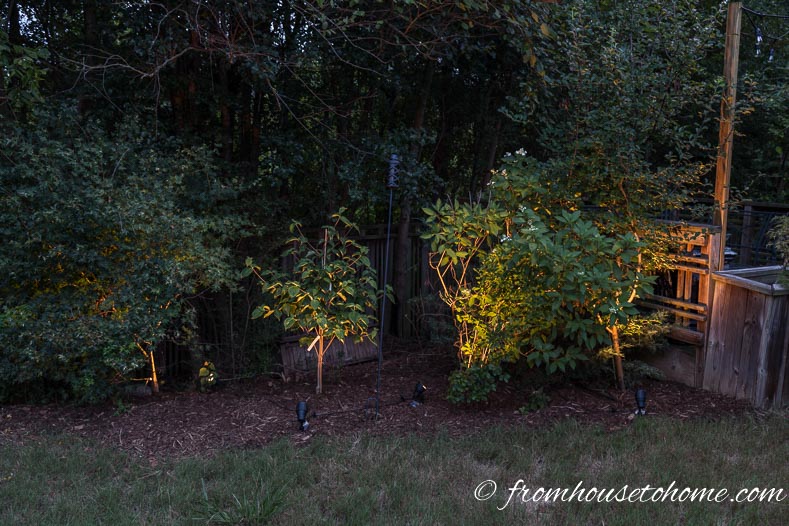
The other trick is try uplighting from different places around the plants. Light some of them from the front, some from the side and some from the back. That will create a mixture of shadows and textures that will keep the scene interesting.
After you have positioned the light, make sure that it is not going to be shining in the eyes of people that are walking around in that area after dark. That will completely ruin the garden experience for your guests (and could be a safety hazard, since a little bit of light in the eyes at night can make it very hard to see).
Spotlight a Bird Bath, Statue or Fountain
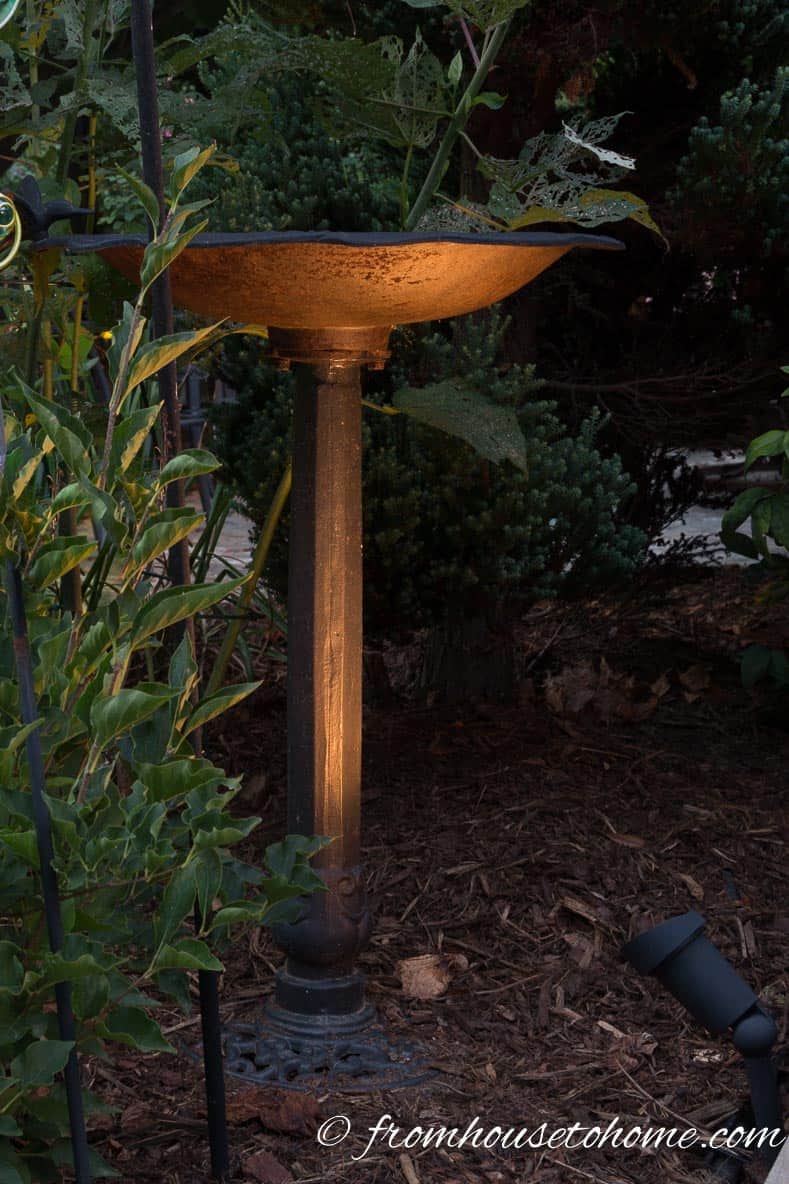
The easiest way to use uplighting is to highlight an object in your garden that you would like to have stand out at night (a bird bath or statue for example).
Position the light at the bottom of the object and point it upwards at an angle so that the light reflects off the item.
For larger objects, you may need more than one light pointed at it from different directions to really make it stand out.
Make Foliage and Flowers Glow
Another one of the outdoor lighting ideas for uplighting is to make a focal point out of foliage and flowers.
The uplights under these Japanese Cherry trees really make the bloom colors stand out. You can achieve a similar look with any trees that are not too dense…Japanese Maples and Dogwood Trees are good examples.
Highlight Tree Trunks
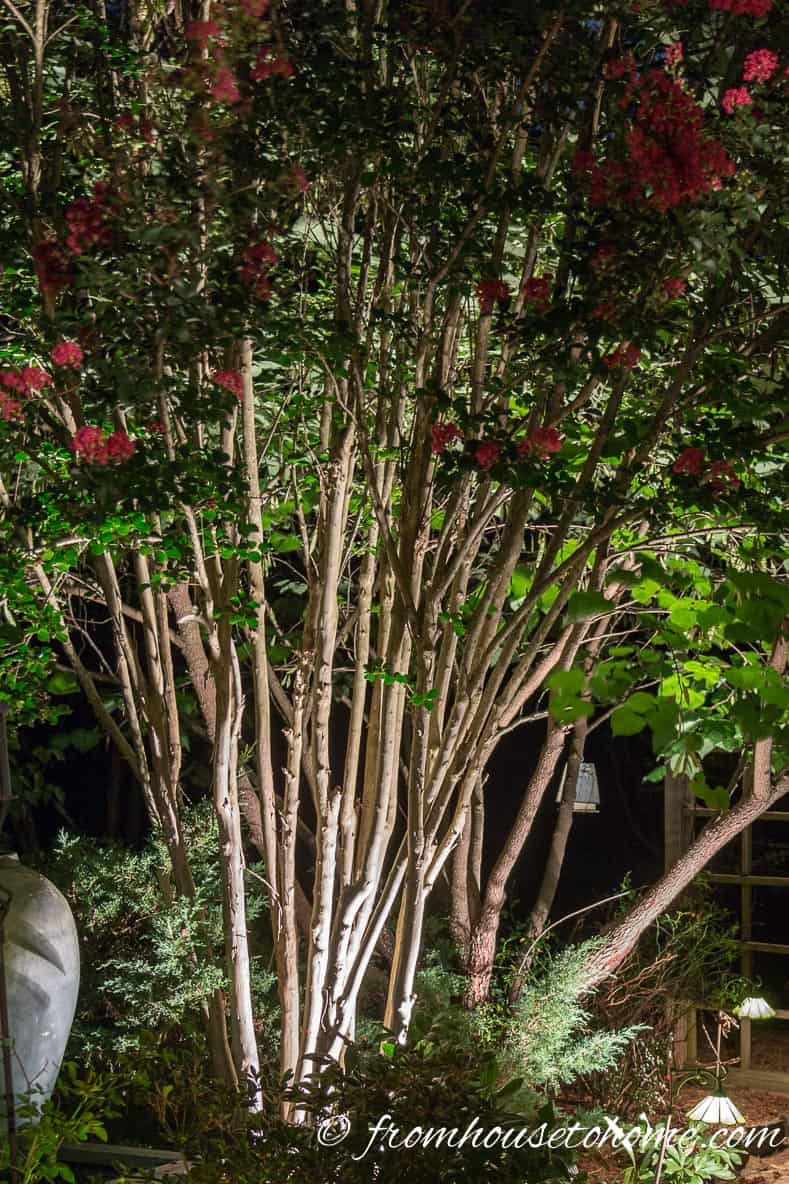
Similarly, uplighting trees is another way to take advantage of uplighting landscape lighting effects.
For taller trees and bushes that have interesting bark or trunk structures (like this Crape Myrtle), use uplighting to make those trunks into an architectural feature in the garden.
Grazing
Grazing makes textures stand out, Photo by Gregory Phillips Architects
Note: This image cannot be pinned since it comes from houzz.com.
The grazing landscape lighting effect is a special kind of uplighting that is created when you install a spot light close to the bottom of a straight surface (such as a wall) and point the light straight up.
Enhance The Look Of A Stone Wall
The most common way to use grazing is to highlight the front of buildings.
Grazing enhances the texture of whatever is being lit, so it works quite well for lighting stone or brick walls. Using interesting colors also adds to the effect.
This effect will need a light fixture that is strong enough to light the entire height of the surface. For a building such as the one above, this probably means you need standard, full-power spot lights.
Show Off The Texture Of An Evergreen
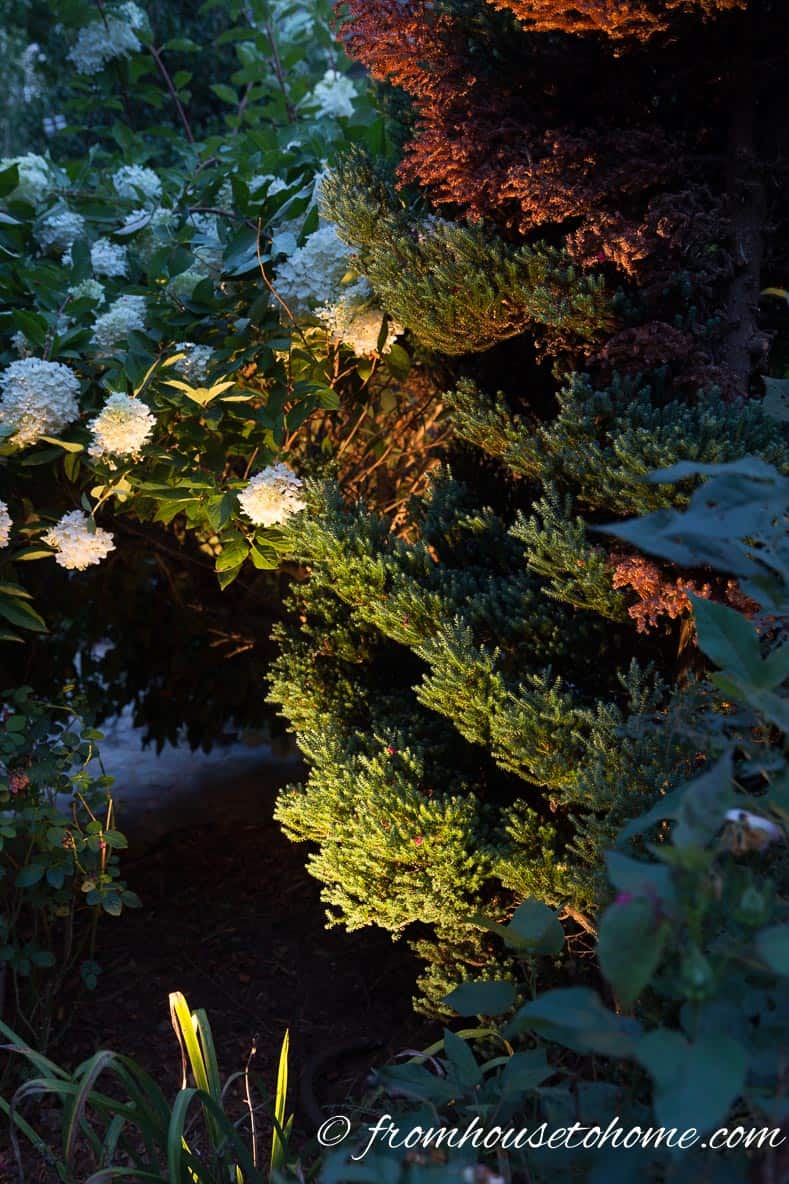
However you can using grazing to create an interesting landscape lighting effect on dense plants such as evergreens.
For a relatively small evergreen such as this one, a 20 Watt low-voltage light will do the trick. Solar lights will probably not be able to provide the power required.
Pathway Lighting
One of the most common landscape lighting effects is to use pathway lights to make walkways safer at night.
The trick to doing this successfully is to avoid having the lights lined up in a straight row (which looks too much like an airplane runway).
Tulip Low Voltage Pathway Light*
Pathway lights are usually 18″ to 27″ tall and spread light downwards to light the ground beneath them.
I find that low voltage lights generally work better for this function than solar lights…the light seems to extend further from the fixture making it easier for people to see where they are walking.
Install Path Lights Among The Plants
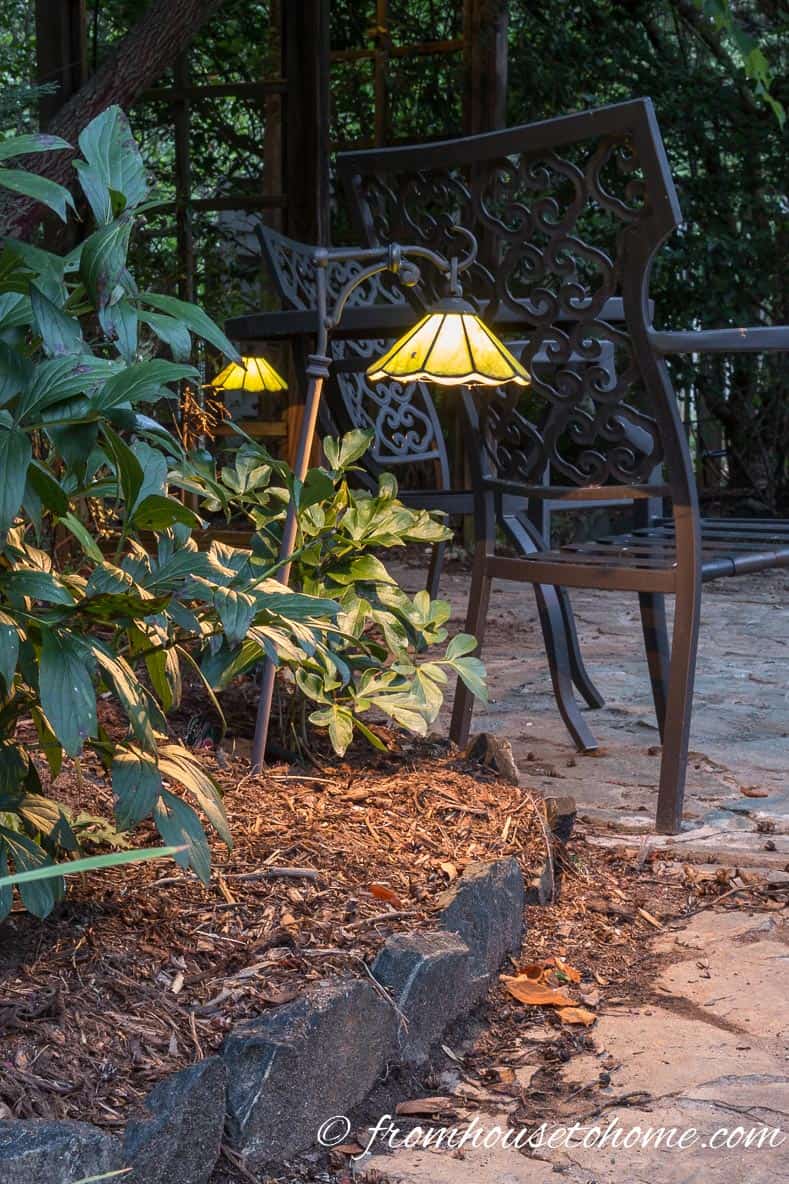
To prevent the path lights from looking like lined up soldiers, try installing them between plants so that there is something to break up the line.
Stagger The Lights
Stagger pathway lighting so it isn't in a straight line, Photo by System Pavers
Note: This image cannot be pinned since it comes from houzz.com.
Another option is to stagger the fixtures so that they create more of a zig zag or curve. That way they don't line up perfectly with each other and you avoid the runway look.
Deck Lighting
Decking & Ground Lights, Photo by B&Q
Note: This image cannot be pinned since it comes from houzz.com.
If you want to be able to use your deck in the evening, deck lighting helps to add ambiance and safety.
This is one of the outdoor lighting ideas where I prefer solar lights to low voltage lighting. Since they don't require wiring, solar lights are so much easier to install on stairs and railings without having to worry about hiding wires.
Light The Stairs
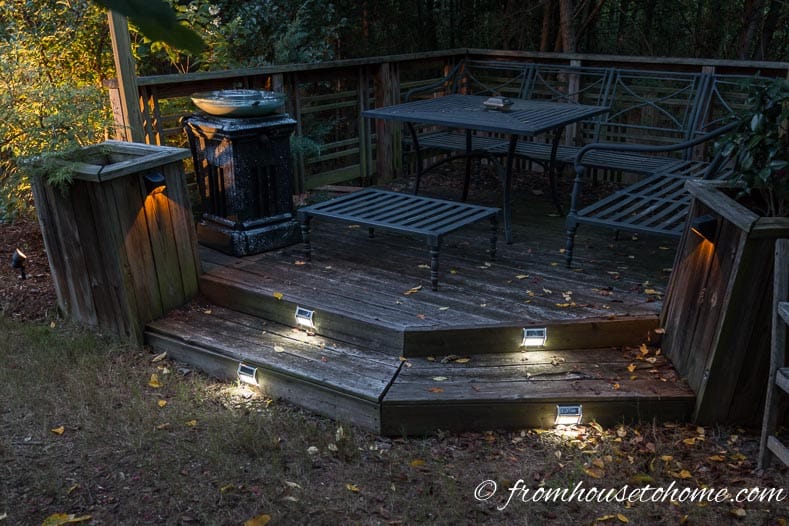
Adding lights on the step risers makes it very clear where each step is and helps to prevent people from tripping on them when it's dark.
These small solar lights are easy to install and do the job perfectly.
Add Ambiance To Railings And Planters
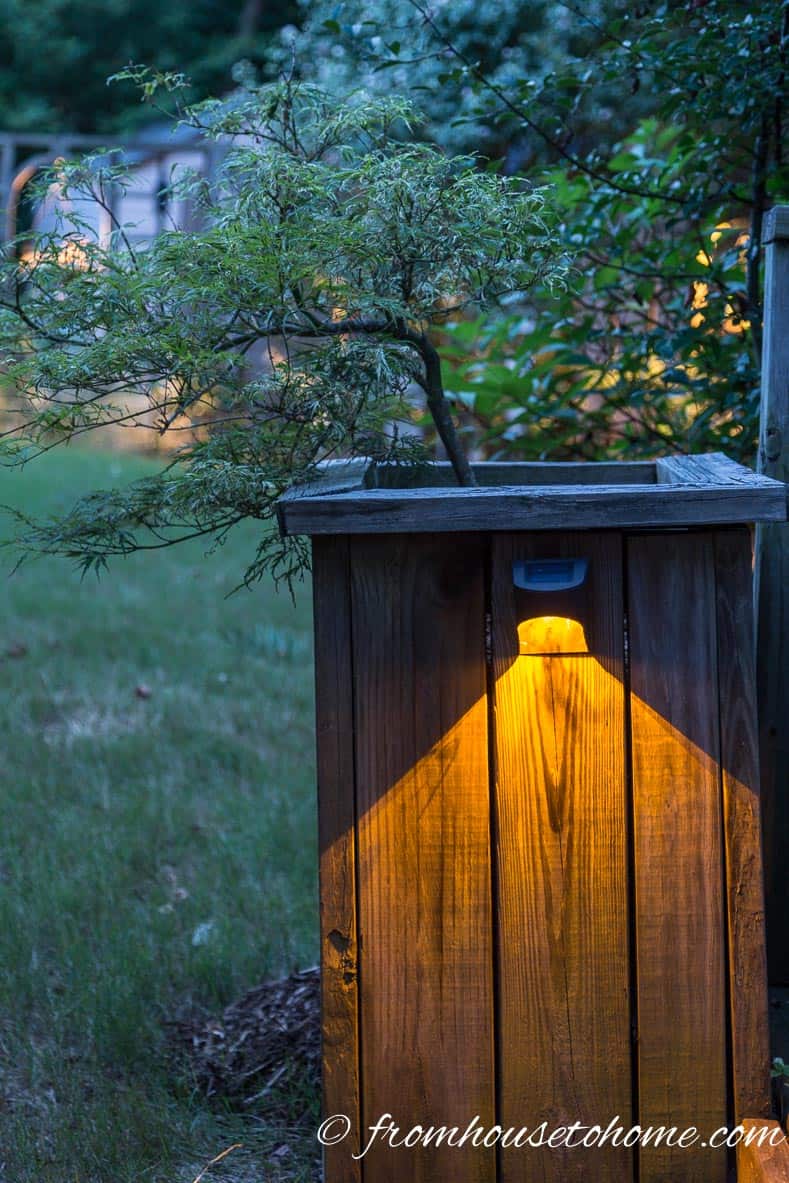
Installing small lights with downward facing bulbs on planters and railings provides light on the deck but makes sure that it doesn't shine in people's eyes.
Repeated lights created an interesting pattern, Photo by System Pavers
Note: This image cannot be pinned since it comes from houzz.com.
If you have a few of them in a row, they also add an interesting light design.
Use Post Lights For Extra Visibility
There are some landscape lights that are made specifically to sit on top of fence or deck posts. The solar versions are really easy to install and provide higher level light for your deck.
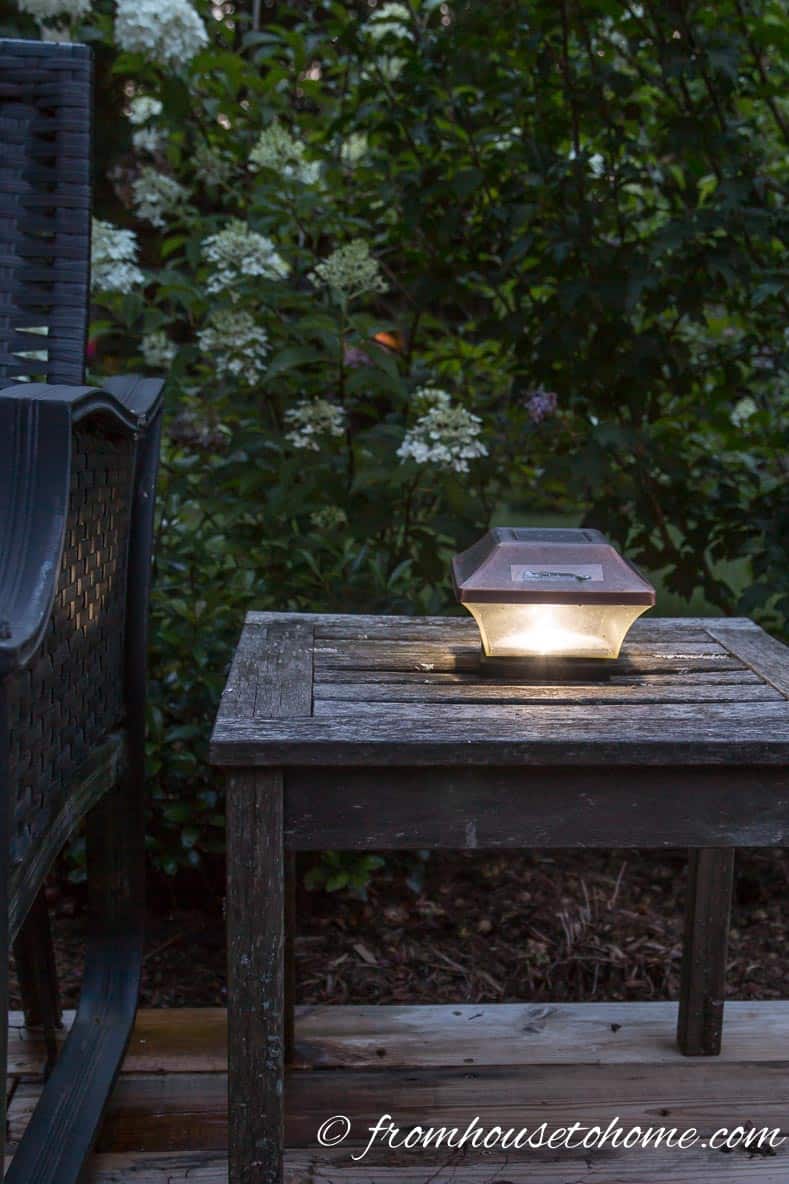
I even like to use them as a light in the center of the tables on my deck. Because they're solar, you can place them wherever you want, without having to worry about plugging in (or tripping over) cords.
Water Lighting
Submersible landscape lights make a water fountain glow at night, via houzz.com
Note: This image cannot be pinned since it comes from houzz.com.
If you happen to have a fountain or pond in your yard, water lights are a great way to bring the water to life at night.
Submersible lights* can be installed in the water and used as uplights for the fountain. The solar versions are a little easier to install since you don't have to worry about waterproofing electrical wiring.
Task Lighting
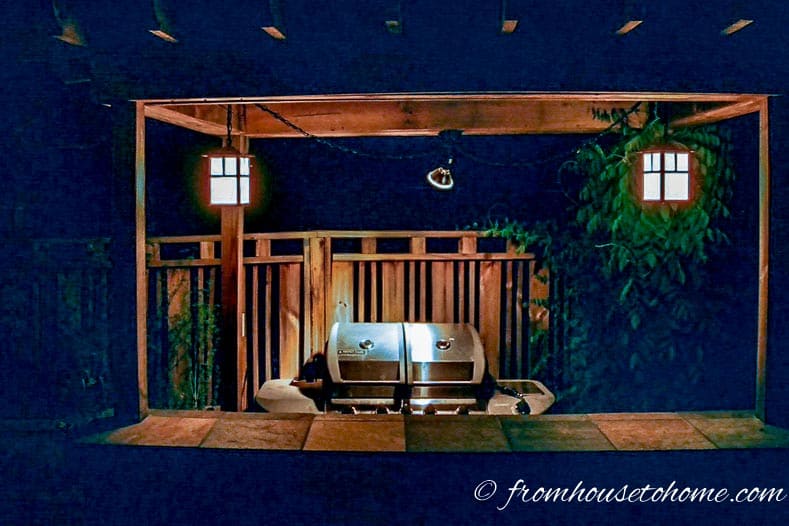
If you have work areas in your yard, like where the grill is, they will require more heavy duty lighting. This usually means standard voltage lighting, since you really need to see what you're doing. Low voltage and solar lights are just not bright enough.
I had the lighting hard-wired for my outdoor kitchen area which makes sure there is always enough light. If you are doing this, check that your fixtures are rated for outdoor use.
Decorative Lighting
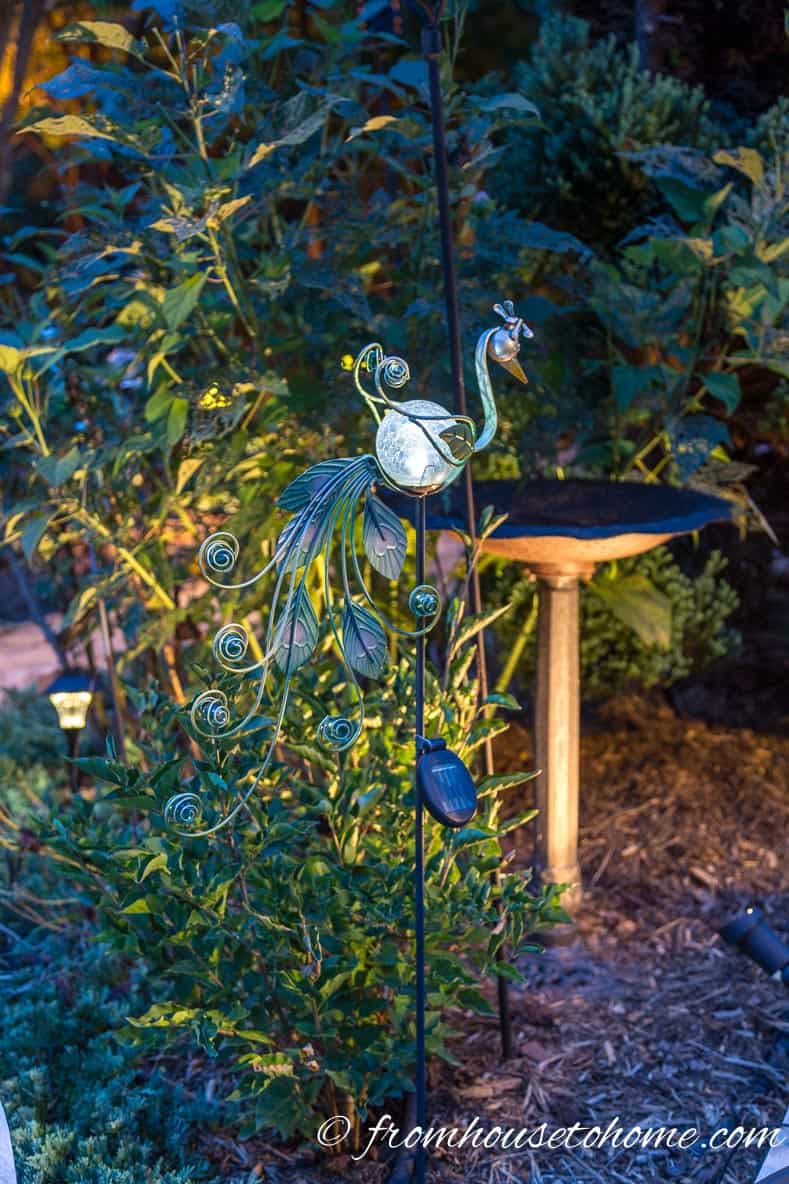
The last one of my landscape lighting effects is decorative lighting. It is exactly what it sounds like…light fixtures that are used more for adding pretty decor to your garden than for their lighting capabilities. These lights generally do not give off enough light to be useful, but that isn't really the point of it.
You can use them in the garden like this peacock stake light.
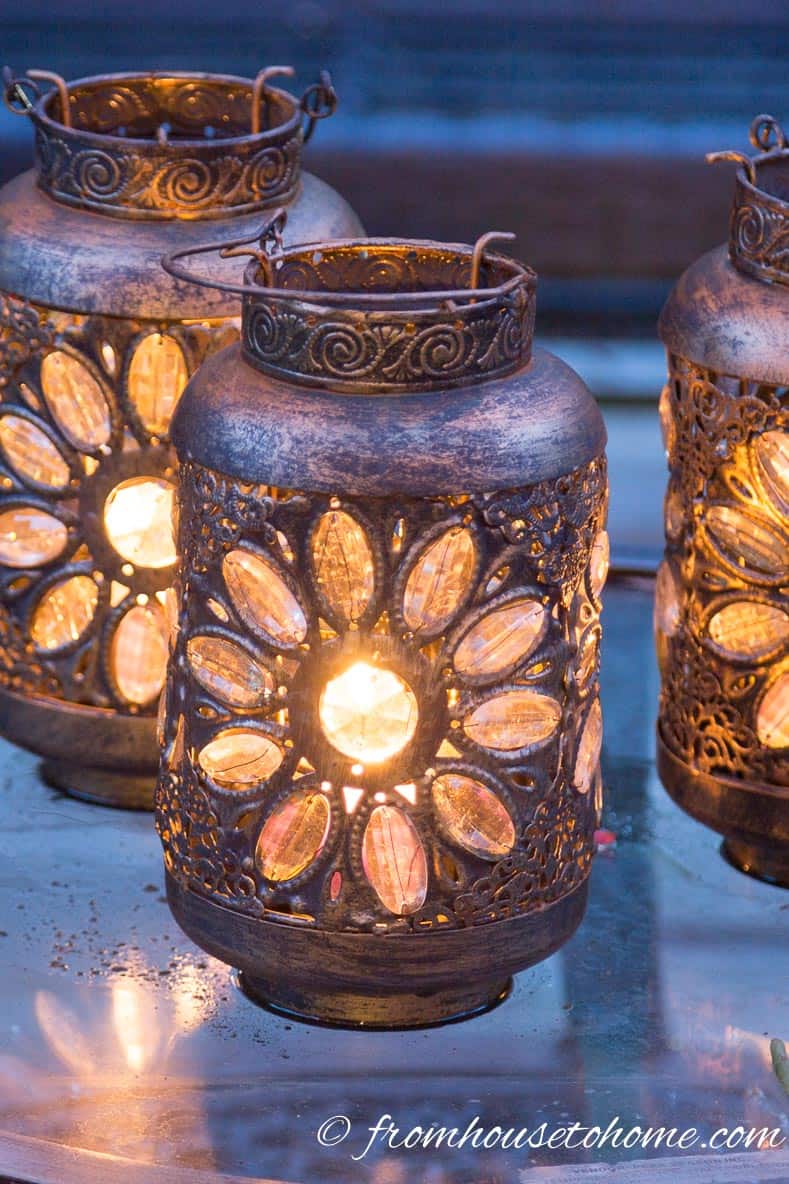
Or place them on a table like these lanterns.
Hopefully these landscape lighting effects will help you come up with some outdoor lighting ideas for your own garden. Be sure to check out our landscape lighting installation post to see how to create your own garden lighting plan!
Have comments or questions on 8 Landscape Lighting Effects and How To Use Them? Tell us in the section below.
Pin It So You Don't Forget It!
[columns] [span4]
[/span4][span4]
[/span4][span4]
[/span4][/columns]
This post was originally published on August 3, 2016 but was updated with new content on November 23, 2024.


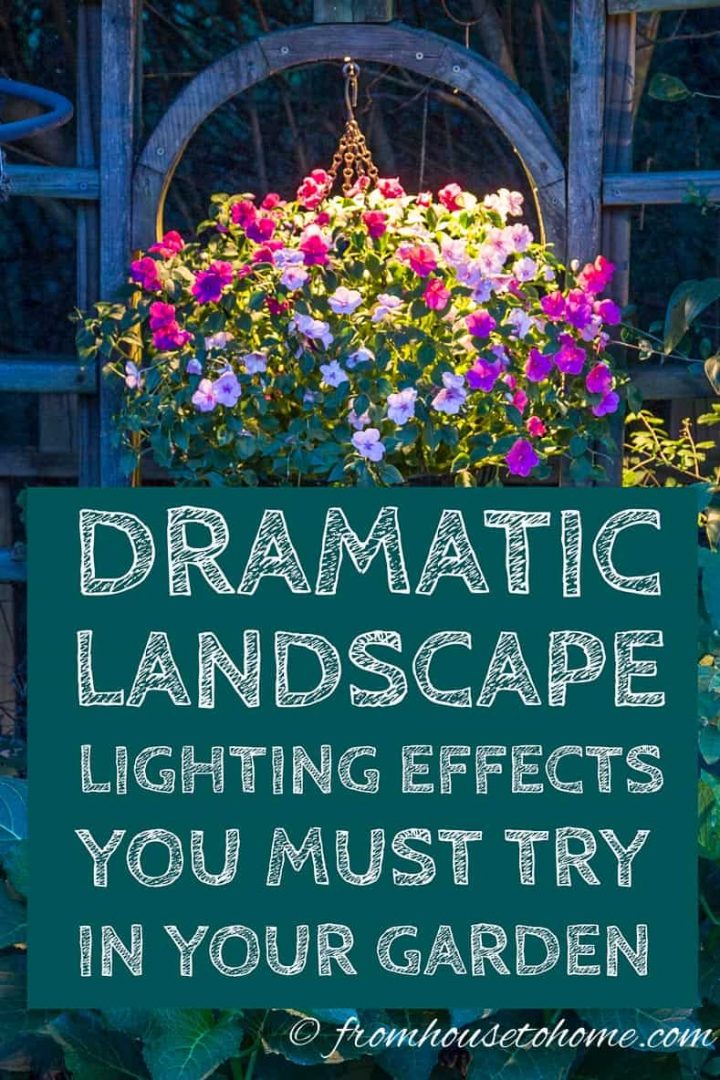
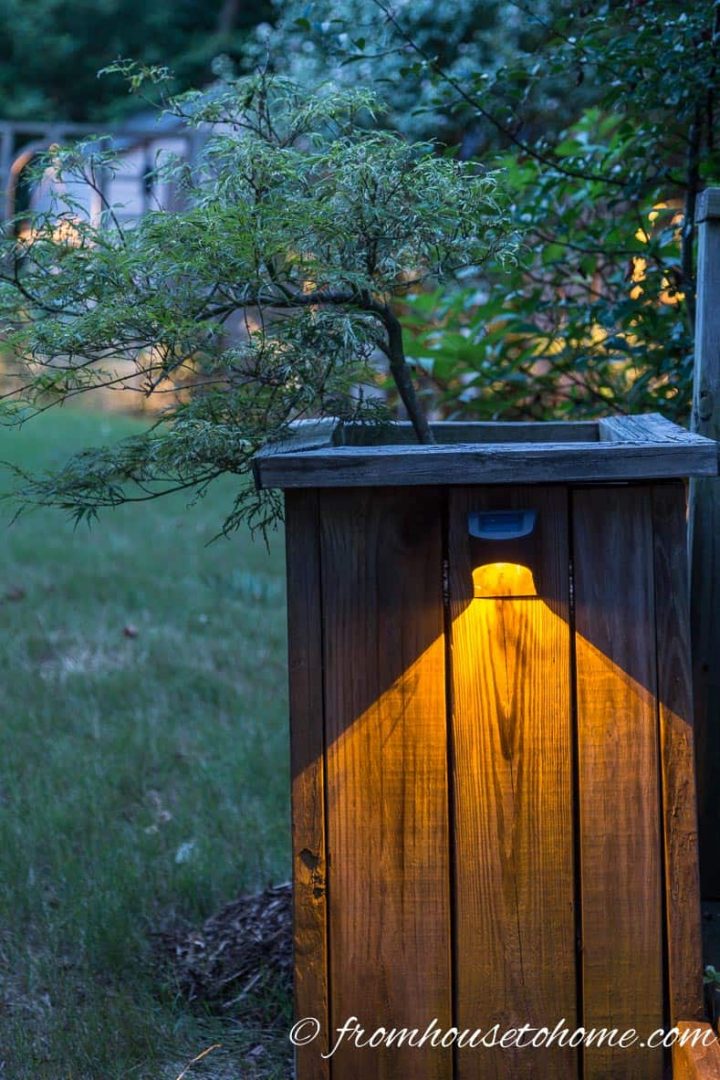
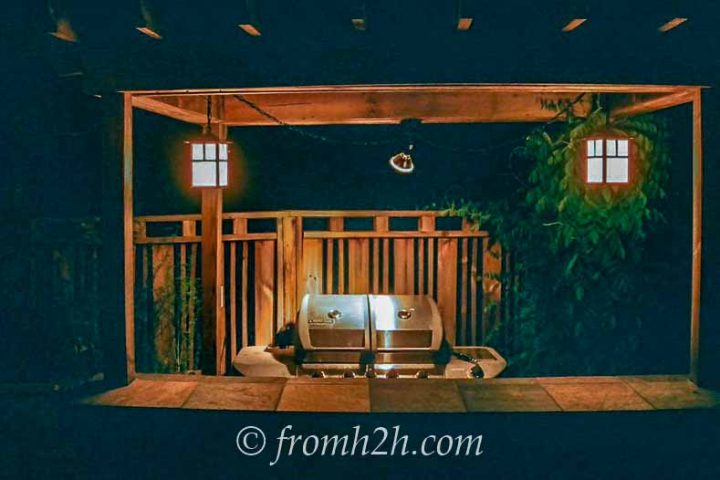
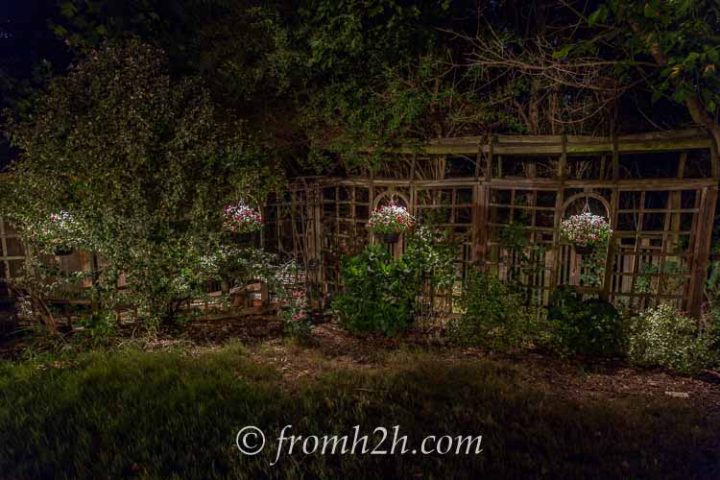
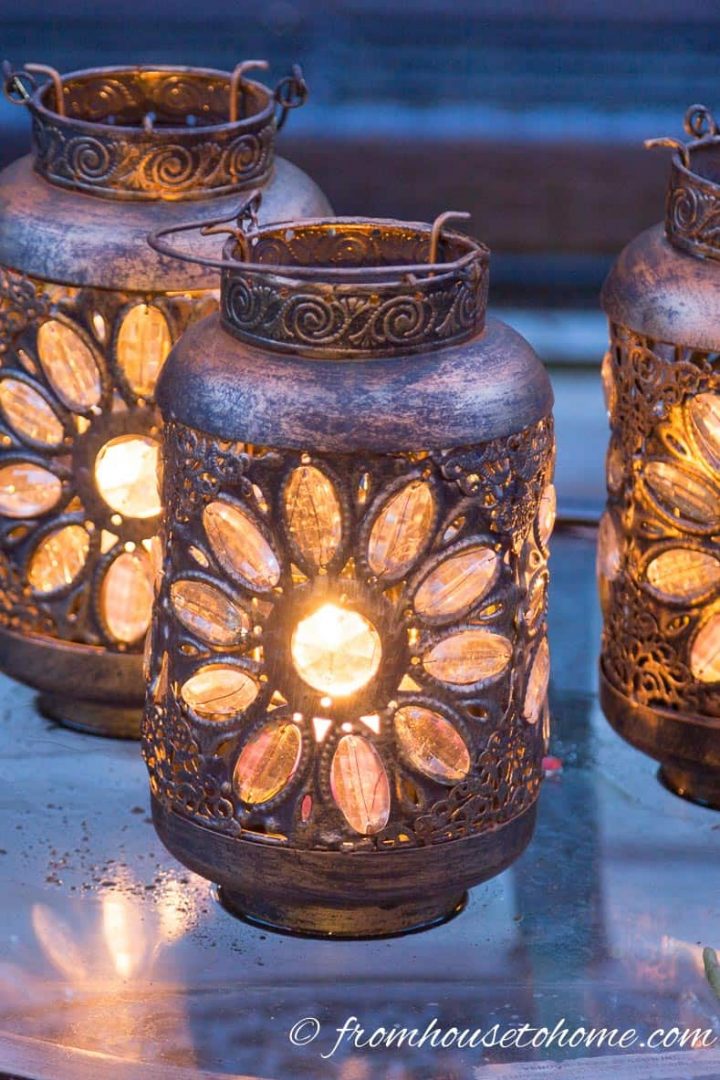
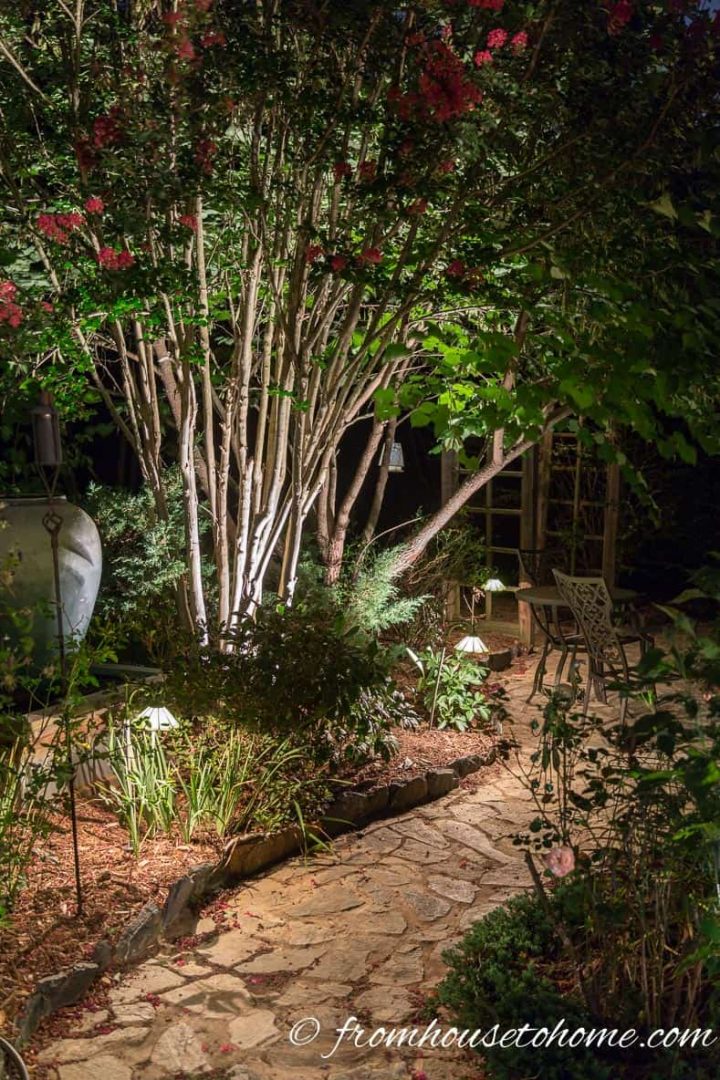
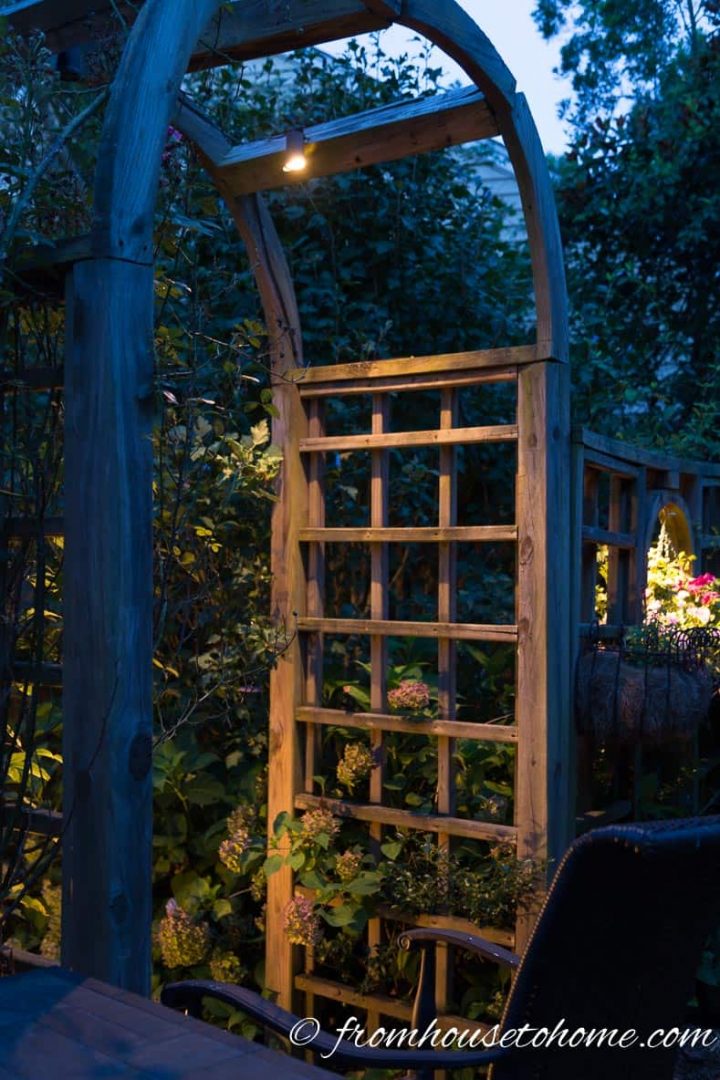
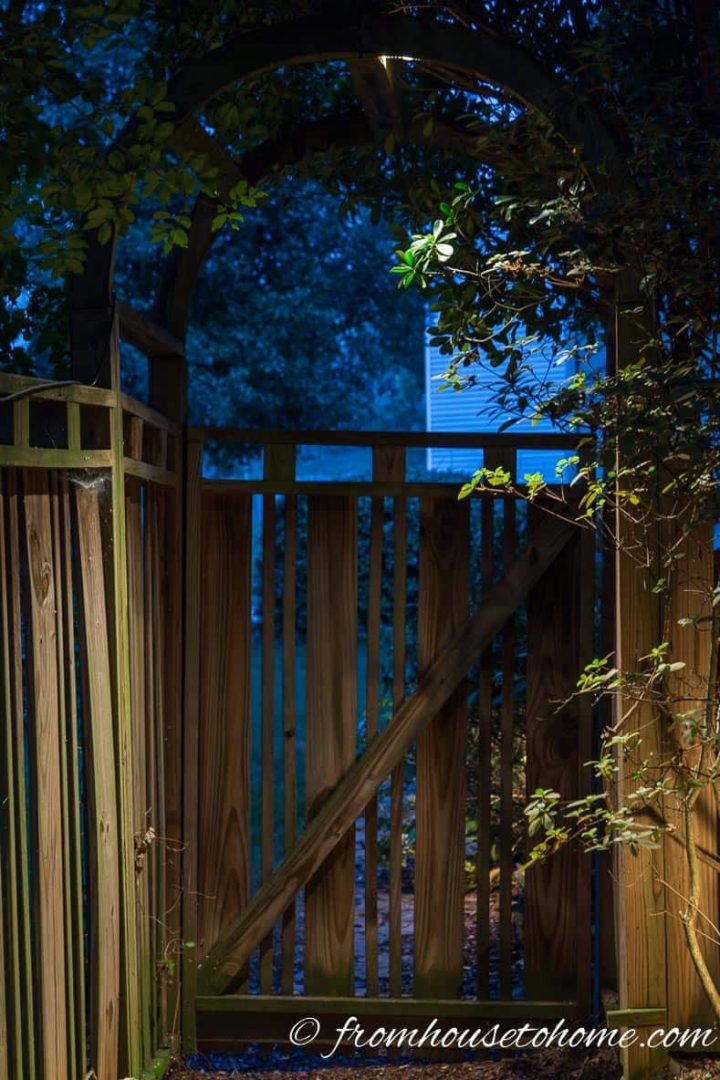
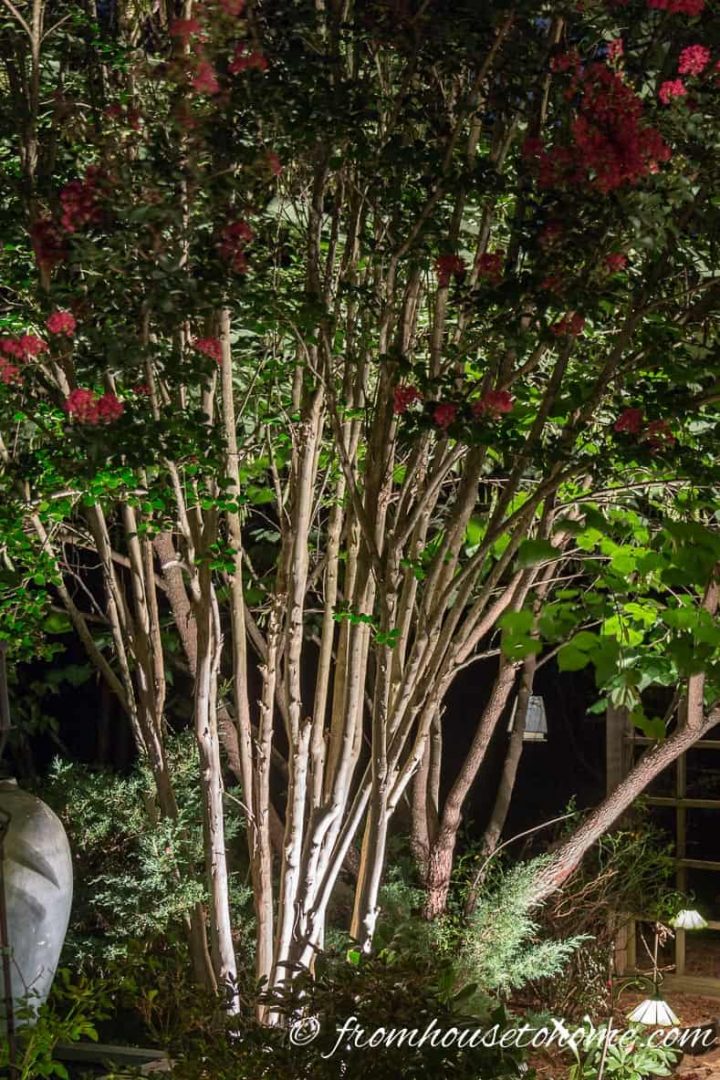

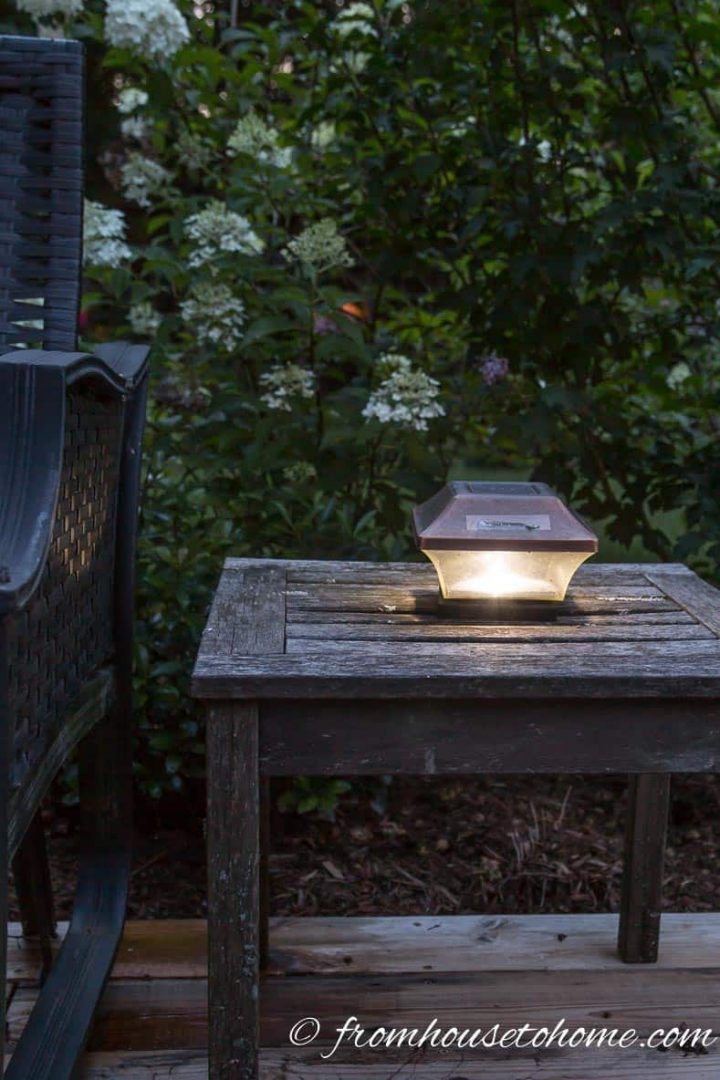
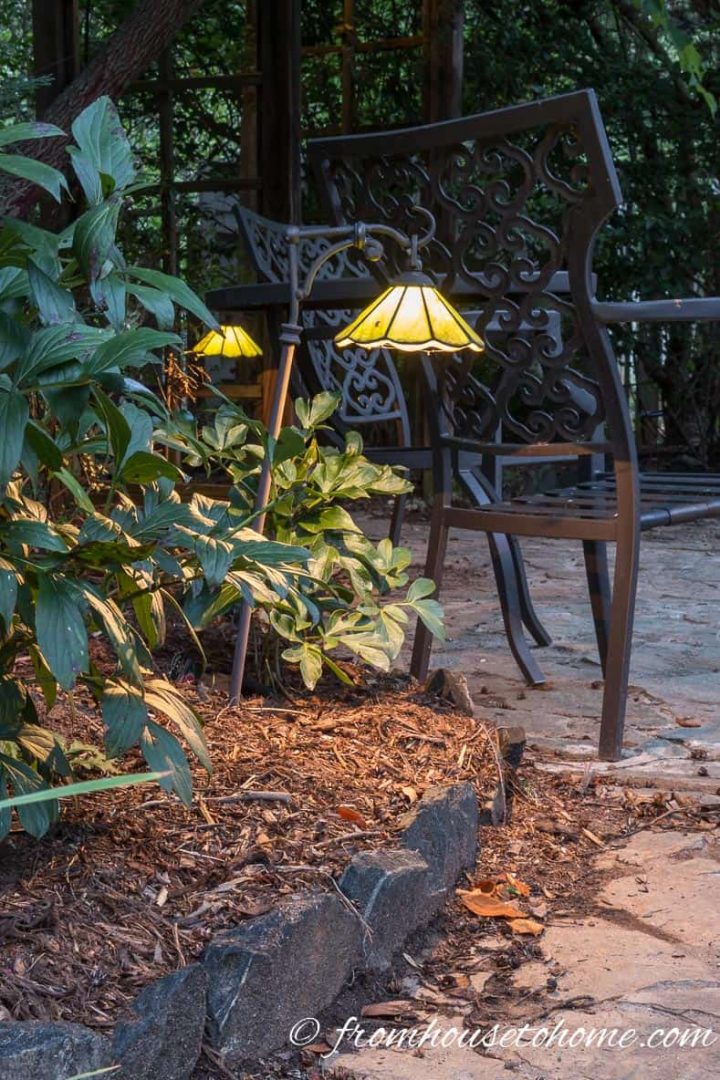
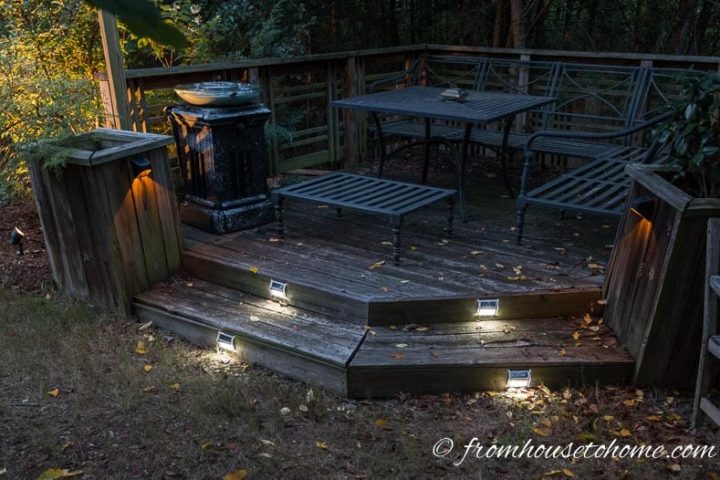

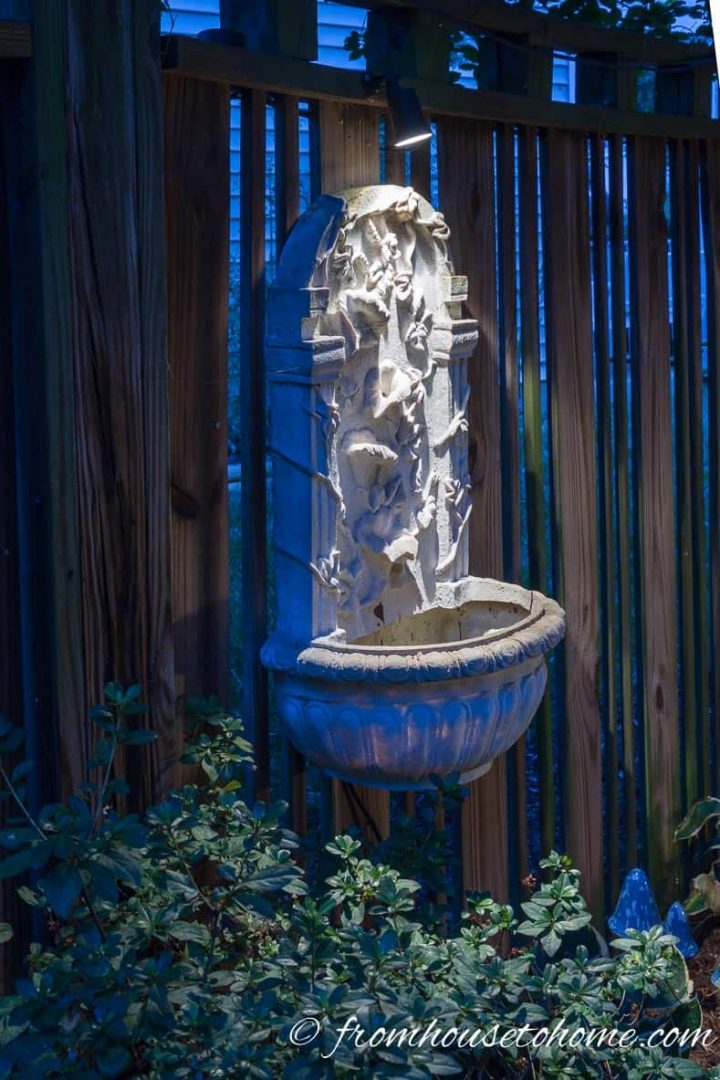
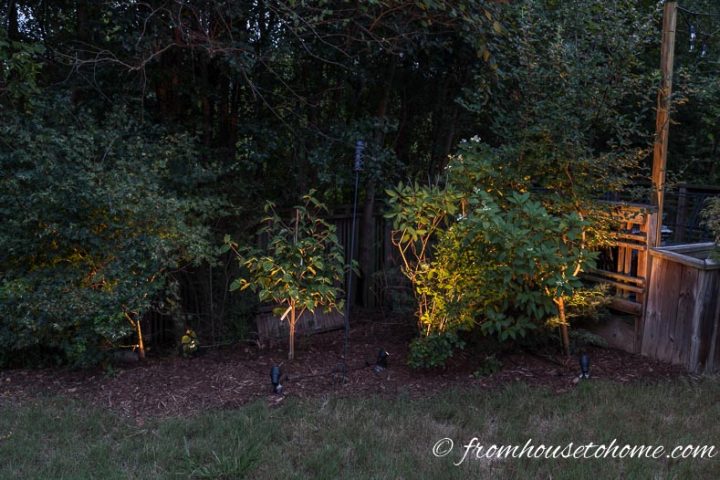
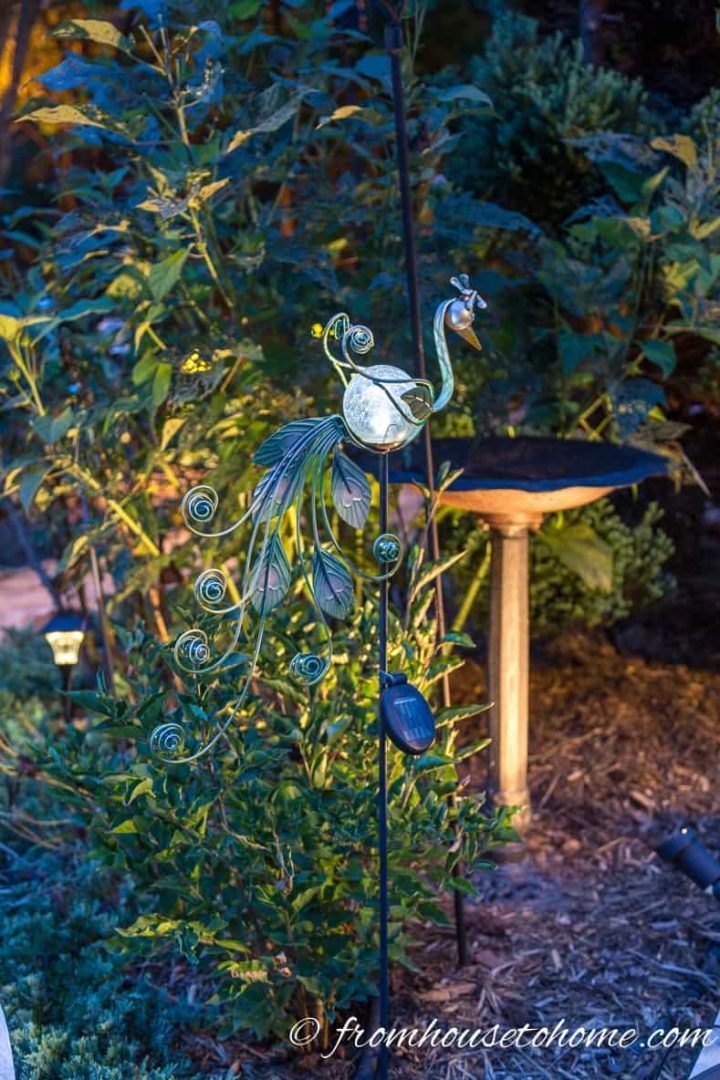






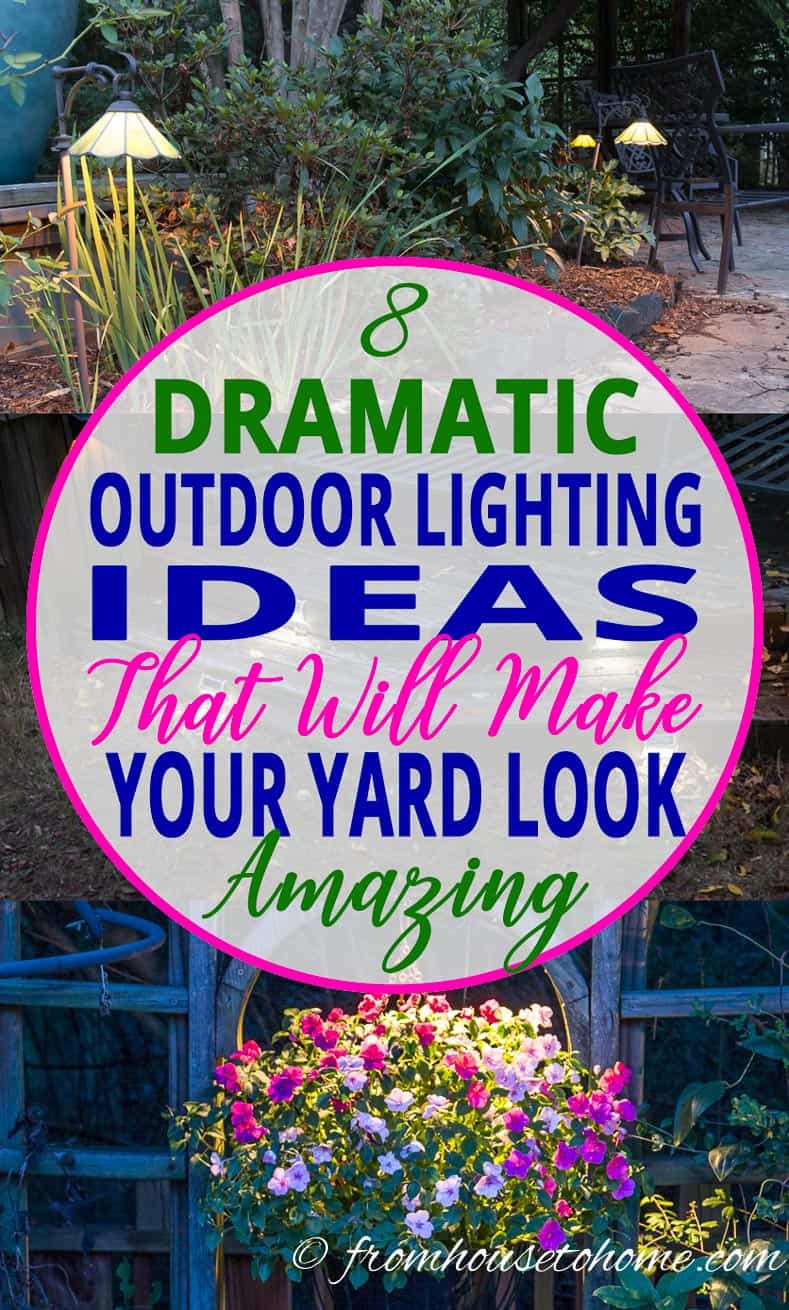
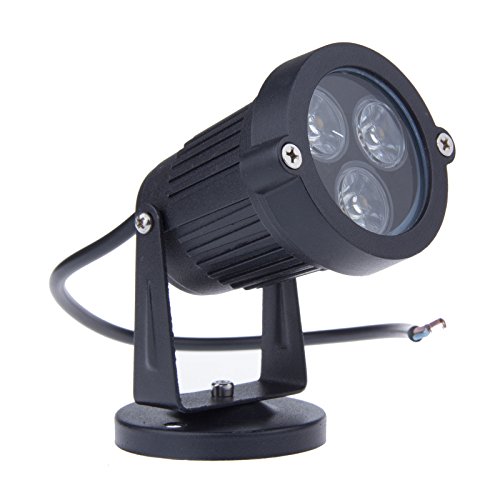
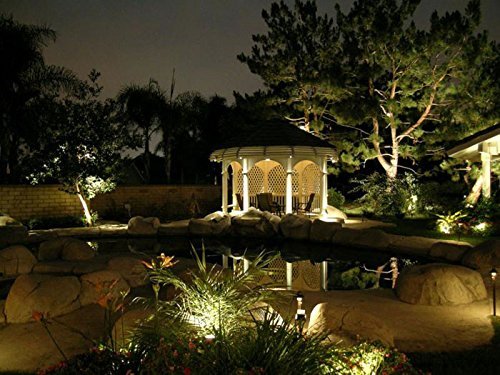
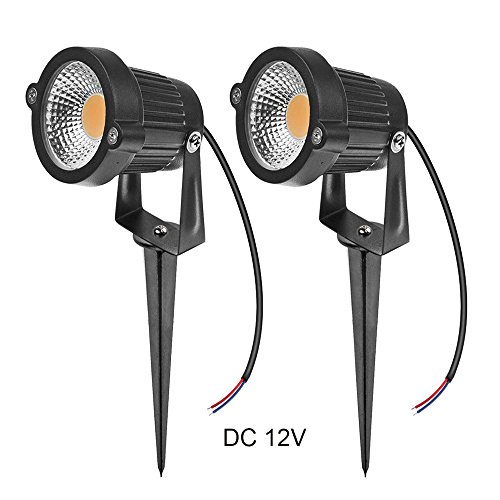
![Inokashira Park Cherry blossoms By Manish Prabhune (Own work) [CC BY-SA 4.0 (http://creativecommons.org/licenses/by-sa/4.0)], via Wikimedia Commons | 8 Landscape Lighting Effects And How To Use Them | Whether you're looking for DIY landscape lighting ideas for your front yard, backyard or walkway, this list will help! It shows you lots of ways to use both low voltage and solar lights in your garden or patio.](https://www.fromhousetohome.com/garden/wp-content/uploads/sites/12/2016/07/unnamed-file-2.jpg)
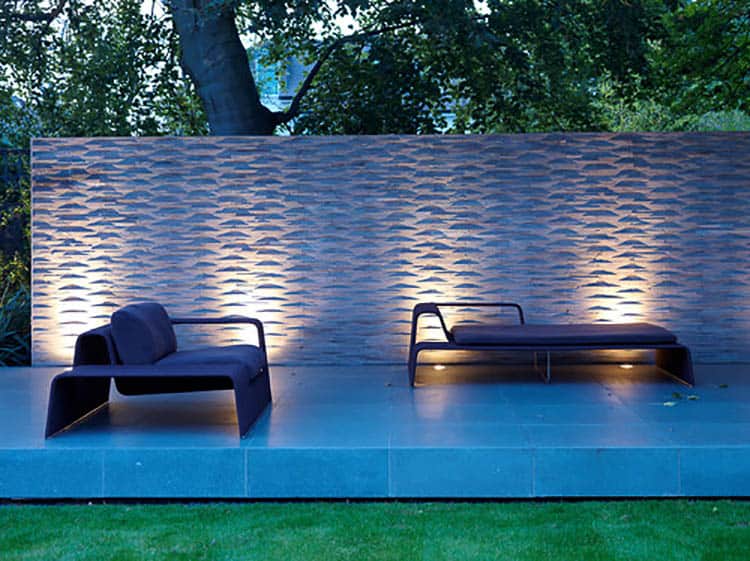
![Buenos Aires - Monserrat - Frente de Casa Rosada sobre Rivadavia by Galio (Own work) [CC BY-SA 3.0 (http://creativecommons.org/licenses/by-sa/3.0)], via Wikimedia Commons | 8 Landscape Lighting Effects And How To Use Them | Whether you're looking for DIY landscape lighting ideas for your front yard, backyard or walkway, this list will help! It shows you lots of ways to use both low voltage and solar lights in your garden or patio.](https://www.fromhousetohome.com/garden/wp-content/uploads/sites/12/2016/07/1024px-buenos_aires_-_monserrat_-_frente_de_casa_rosada_sobre_rivadavia.jpg)
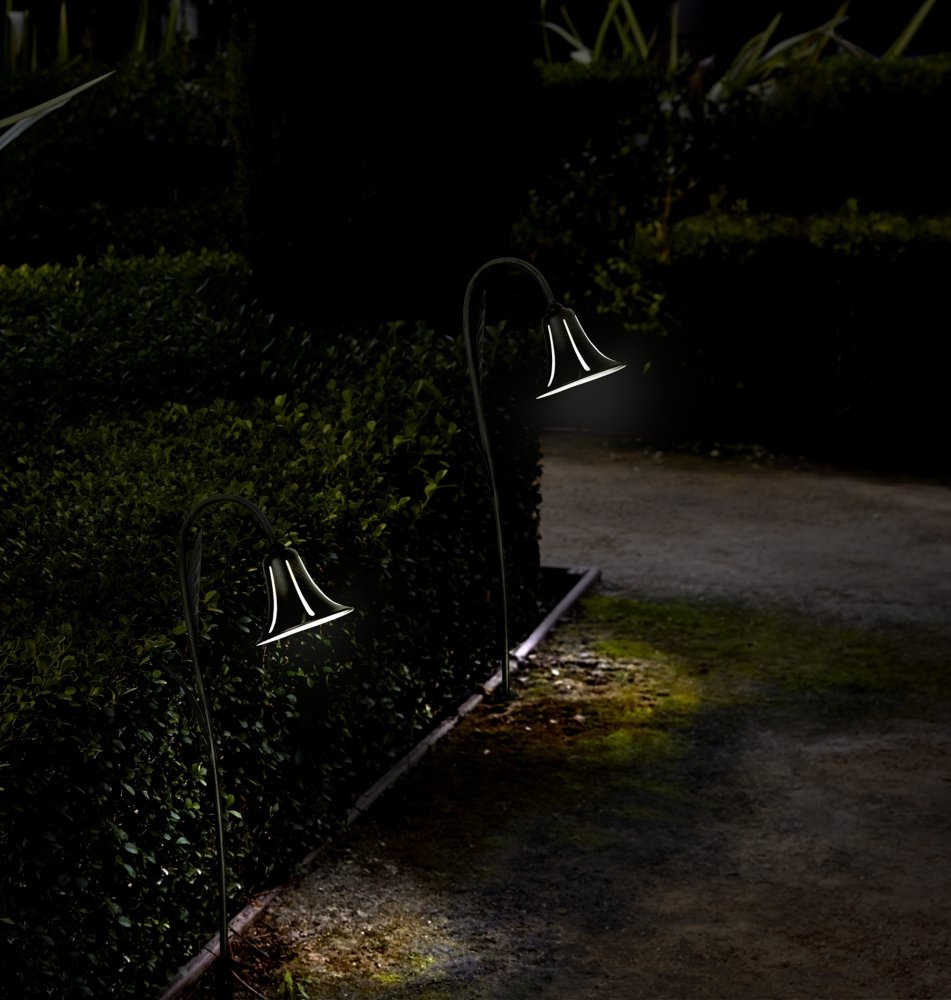
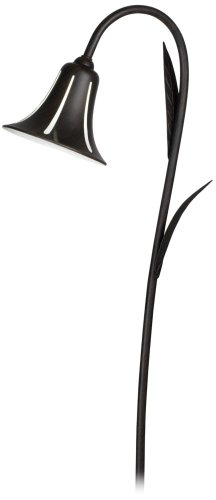
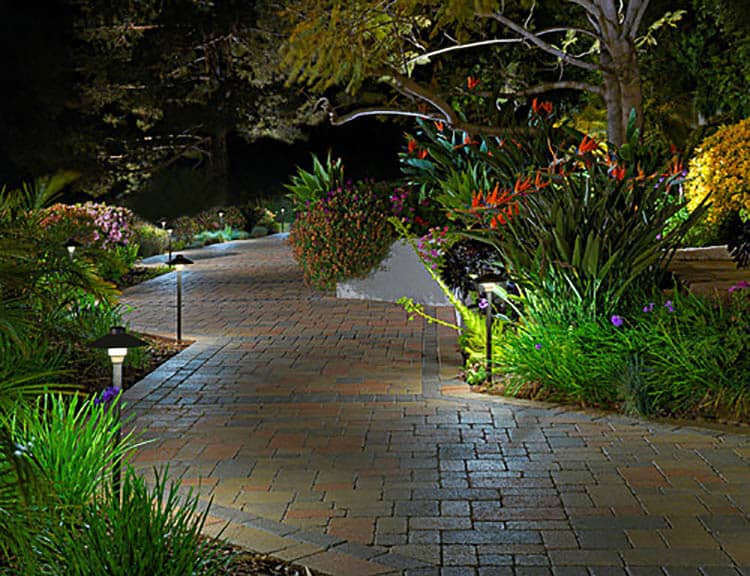
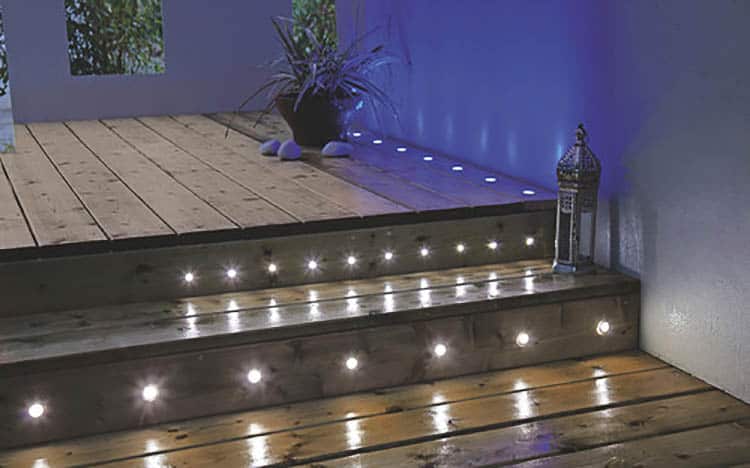
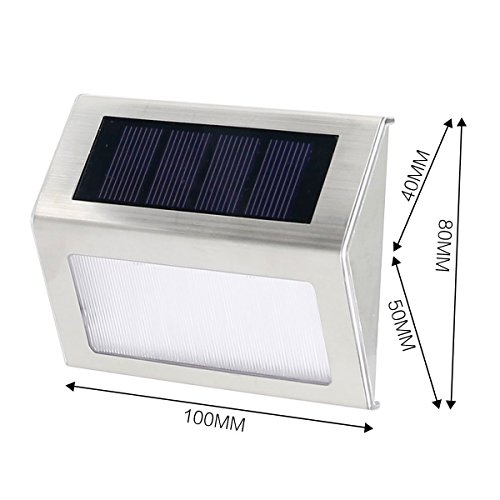
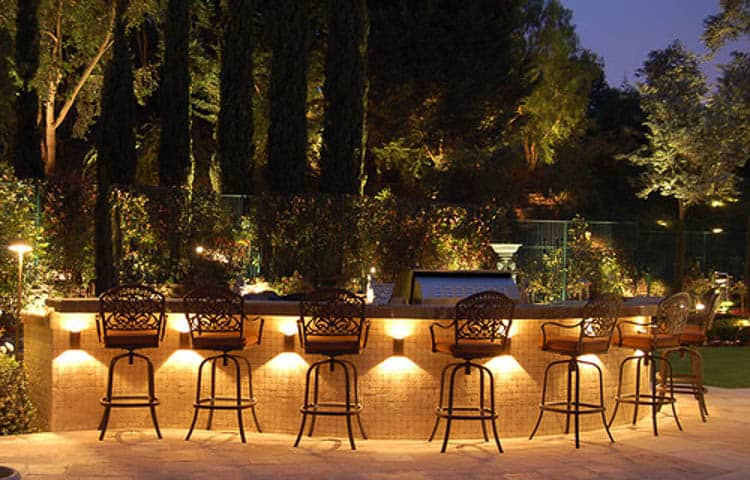
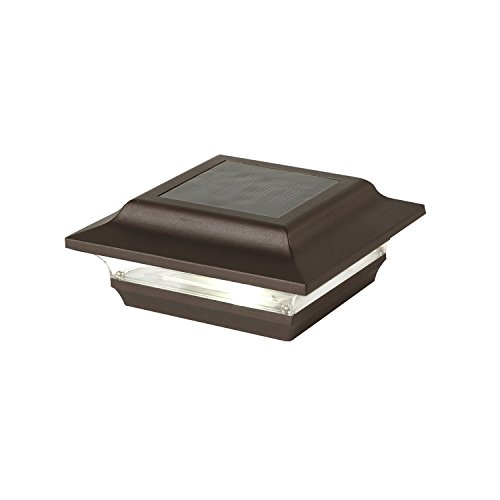
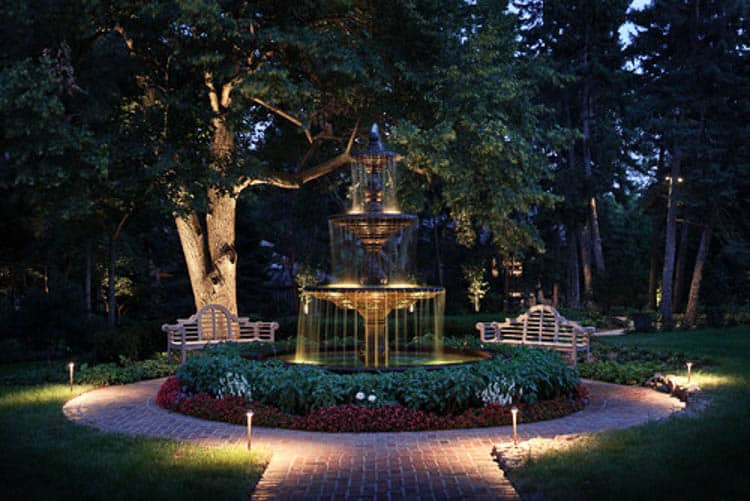
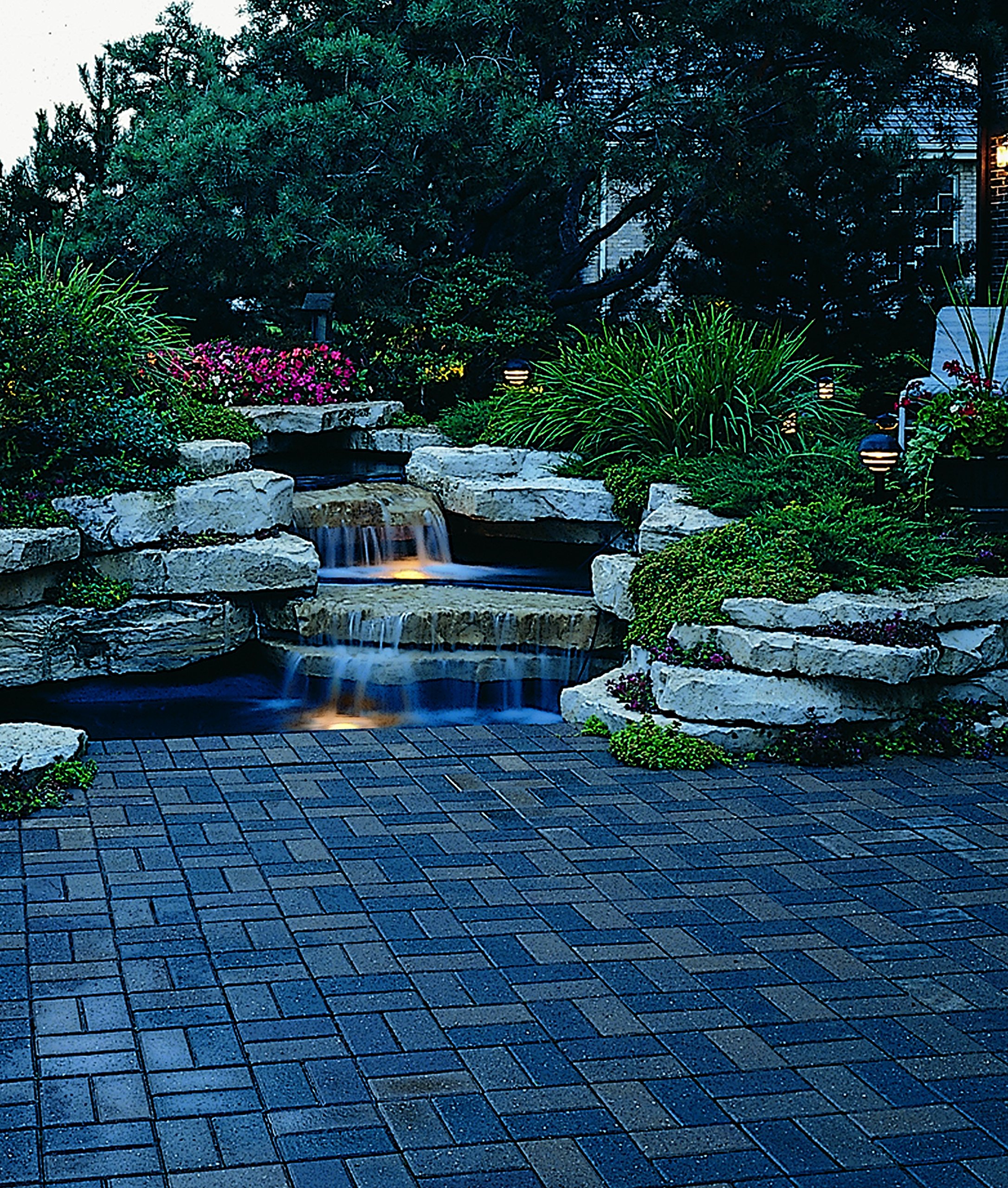
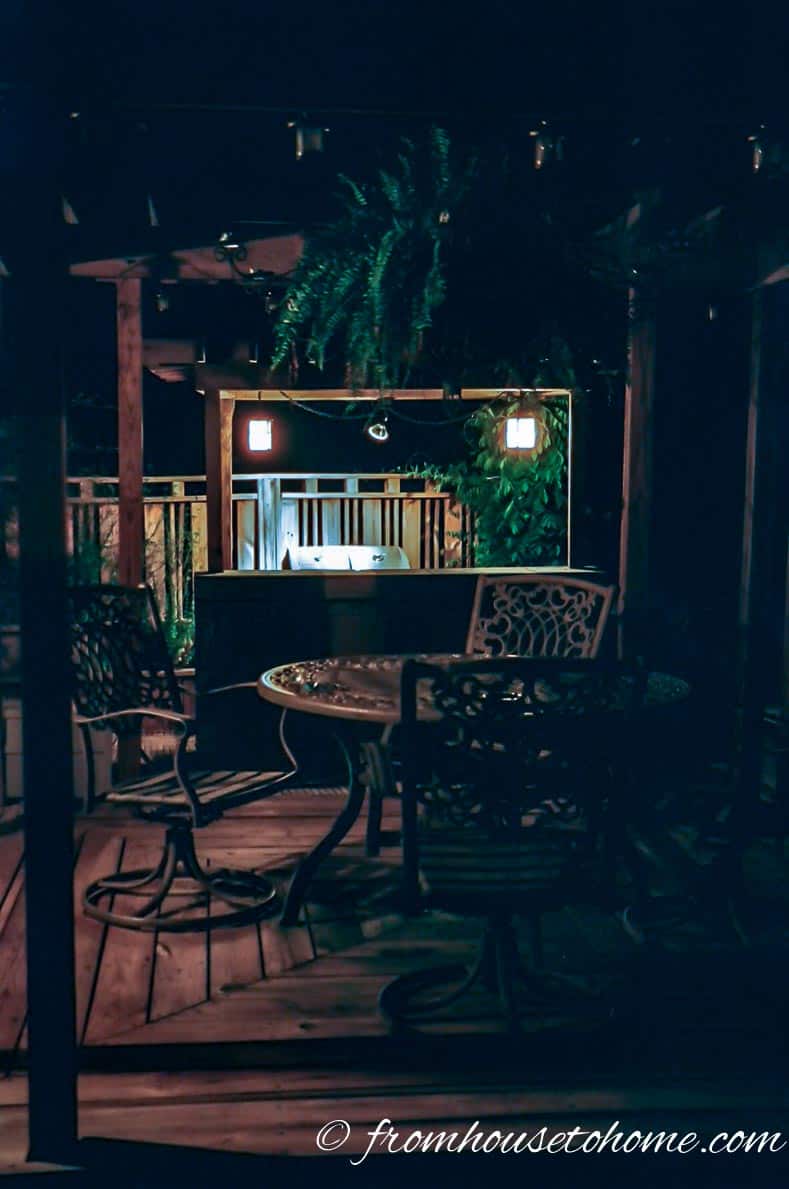
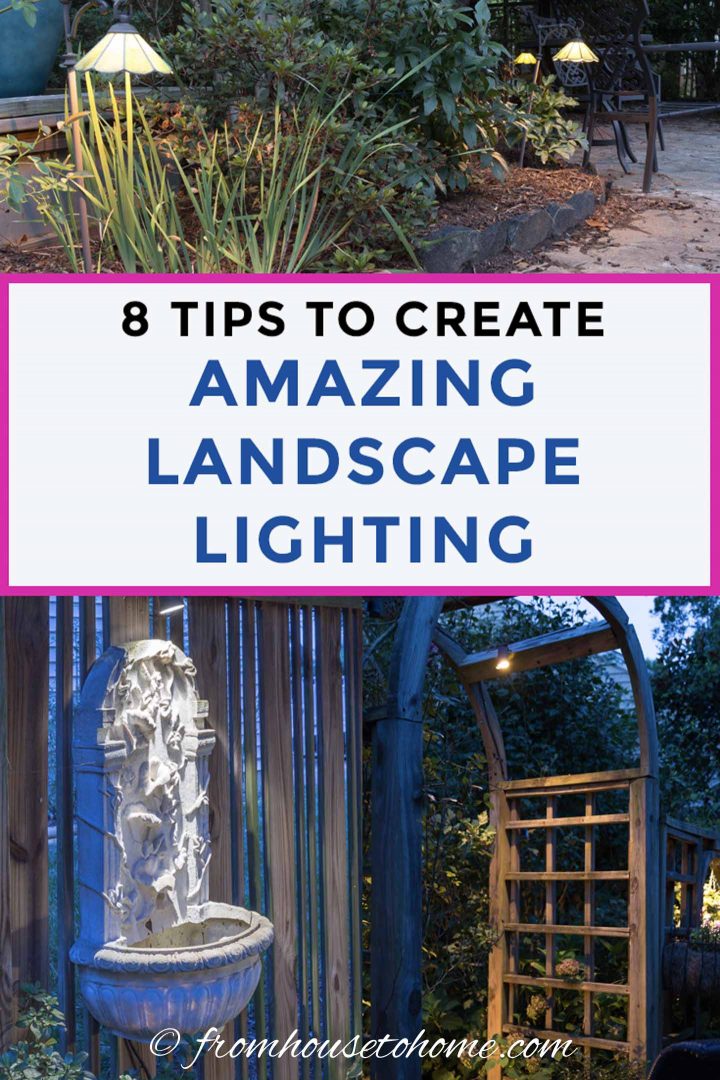
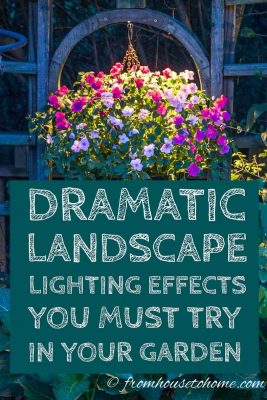
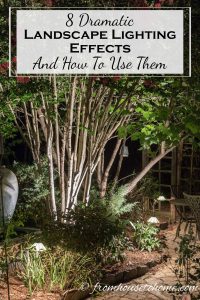
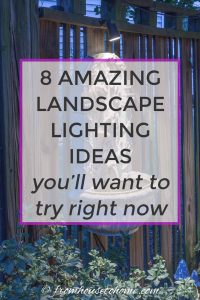
Love your ideas, Wanda. Lighting is an effective way to take a garden day into the nite. Love the way you lit the arbor. Very beautiful.
Thanks, Aunt Elaine! That arbor light was a happy accident…I had strung the wire over the arbor because I needed some lights on the other side of the path and that kept the wire off the walkway. Since it was up there, I decided to try adding a light to it just to see what it looked like, and I thought it turned out pretty well, too 🙂
I love those accidents. They are the serindipities that make creativity so much fun and make us look good.
I like your light tips. I need to get new lighting. I’ll have to hire a contractor.
I love the photo of the deck lights you shared, they look practical and fun! I would like to add some better lighting to my outdoor space, but I don’t have the electrical know-how to do it. I’d appreciate it if an electrician could help me get the job done.
Actually, the deck lights are solar so they don’t require an electrician 🙂
Never ever ever use uplights as downlights! The seal on a uplight is to protect water from entering through the top of the fixture shroud whereas a downlight has a seal to protect the fixture from water that would enter from the bottom of the fixture. This is a common mistake with the homeowner specials, if you want longevity use the proper fixtures for the proper lighting techniques…otherwise not half bad
Hi Sal…I know that’s what people say. But the uplights I used were very inexpensive (their cost was about 10% of the downlights intended for that purpose). They last for 4 or 5 years before needing to be replaced. So I could use and replace them for 40 or 50 years before they would equal the cost of one downlight. And since it’s low voltage lighting, there isn’t any concern with electrical shorts. So my real life experience tells me that using inexpensive uplights as downlights actually works quite well.
Absolutely love the path lights between the plants, where do you get them?
Hi Ashli…I bought them at Lowe’s. It was a few years ago so I don’t know if they still carry them. But you could try searching for Landscape Lighting on their site and see what comes up (they usually have a bigger selection online than in their stores).